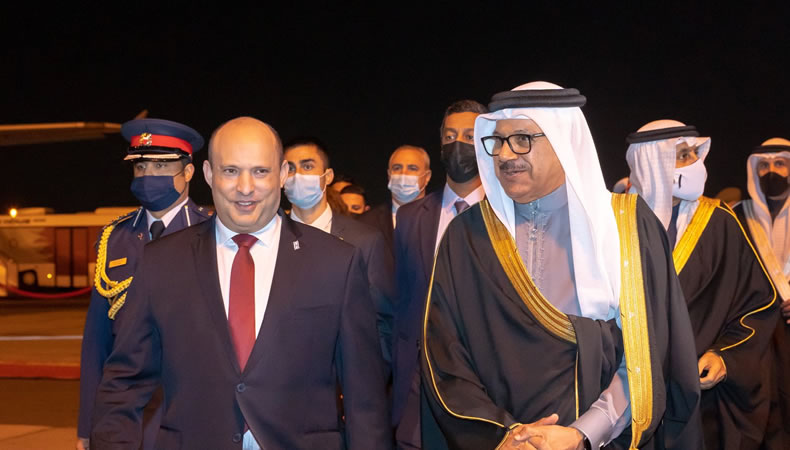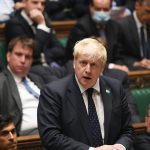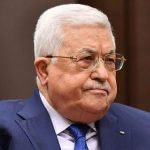Bahrain: Bennett meets with Jewish Community in First-Ever visit by Israeli PM to the Country


Bennett’s visit is the latest such move following the US-brokered 2020 Abraham Accords, which broke with a traditional Arab consensus that precluded any relations with Israel unless the Israeli-Palestinian problem was resolved. According to his office, he stated during a meeting with members of the Jewish community, “I’m really thrilled to be here in Bahrain, and I could think of no better way to start off our visit than seeing my family here.”
Eitan Naeh, Israel’s ambassador to Bahrain, was in attendance, as was Jewish community president Ebrahim Nonoo, and Jewish community member and former Bahraini ambassador to the United States Houda Nonoo. Ebrahim Nonoo conducted prayer services at Manama’s restored synagogue in September, bringing Jewish customs into the open after decades of private devotion. Nonoo told AFP at the time, “We’re quite glad to be out in the open.”
Related Posts
Since 1947, when the Gulf country’s lone synagogue was destroyed in unrest at the commencement of the Arab-Israeli conflict, Bahrain’s small Jewish population of roughly 50 individuals has practiced their faith behind closed doors. When Bahrain normalized relations with Israel, it opened everything up, including renovating a modest synagogue in the middle of the capital for $159,000.
When Bahrain and its close friend, the United Arab Emirates, signed on to the pacts negotiated under US President Donald Trump, they became just the third and fourth Arab governments to establish ties with Israel, after Egypt and Jordan. Bennett paid a visit to the United Arab Emirates in December. “In these turbulent times, it’s critical that we transmit a message of goodwill, collaboration, and standing together against common issues from this area,” Bennett said before departing.
The trip follows Israeli Defense Minister Benny Gantz’s visit to Manama earlier this month, during which the two nations signed a defense deal. Gantz boasted that the arrangement encompassed intelligence, procurement, and cooperative training, and that it solidified the nascent diplomatic ties. The visit also takes place at a time when regional tensions over Iran’s nuclear program are at an all-time high.
Iran is in direct talks with the United Kingdom, China, France, Germany, and Russia, as well as indirectly with the United States, to resurrect the Joint Comprehensive Plan of Action. In exchange for restrictions on Iran’s nuclear program, the deal gave sanctions relief to Tehran. Under Trump’s leadership, the US unilaterally exited the JCPOA in 2018. In late November, the effort to save it was restarted. Bennett’s administration is adamant about not returning to the 2015 accord, arguing that easing sanctions will allow Iran more money to build weapons to use against Israelis.
Bennett’s trip, according to Yoel Guzansky, a senior researcher at Tel Aviv’s Institute for National Security Studies, is “definitely” about Iran. “It’s a show of power, symbolic that the countries are working together,” he added, referring to the Vienna negotiations. According to Dore Gold, director of the Jerusalem Center for Public Affairs, Israel and Bahrain have been pushed toward tighter ties since they are both “threatened by Iranian activity.” He cited turmoil in Bahrain blamed on Iran-backed opposition organizations, as well as Israel’s claims that Iran poses a variety of concerns, including its arming of the Lebanese militant group Hezbollah.
Israel will station a navy officer in Bahrain, which hosts the US Navy’s Fifth Fleet, as part of bilateral defense accords. Bahrain, according to Guzansky, has been regarded as moving slower than the UAE in solidifying ties with Israel in various ways. He did note, however, that permitting an Israeli military commander to be stationed in Bahrain was “important,” noting that Bahrain “does not want to be perceived as an Israeli outpost in the Gulf.”











